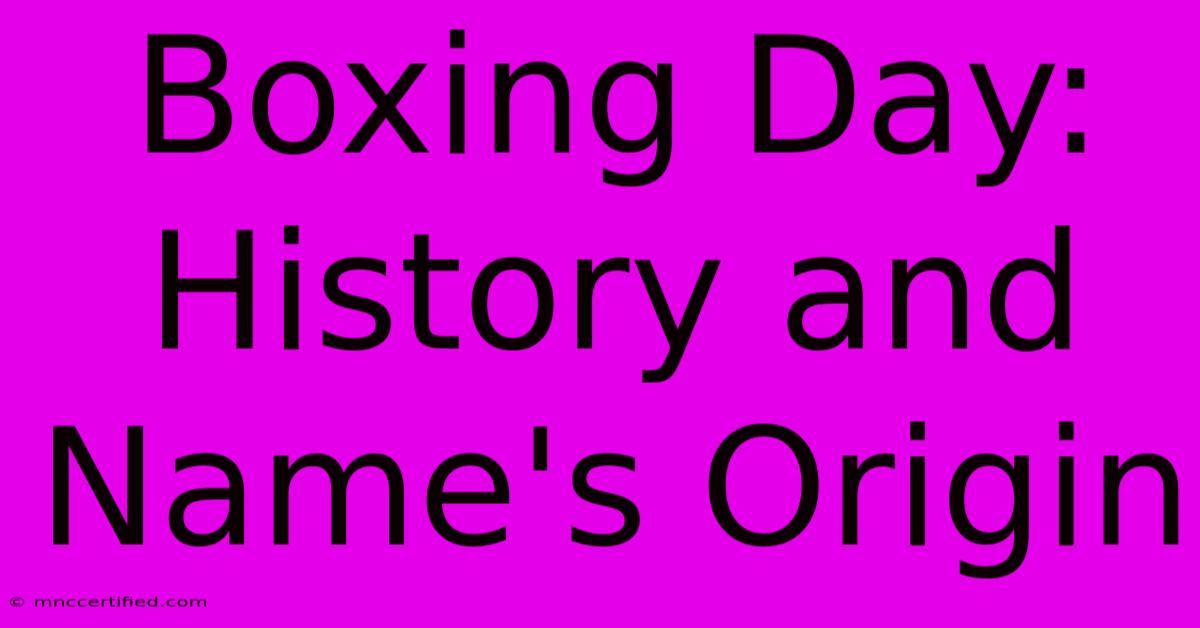Boxing Day: History And Name's Origin

Table of Contents
Boxing Day: History and the Origin of its Name
Boxing Day, a holiday celebrated annually on December 26th, holds a unique place in the cultural calendars of many Commonwealth nations. But what is its history, and how did it get such an unusual name? This article delves into the fascinating origins of this post-Christmas tradition, exploring its evolution from a day of charitable giving to a modern-day shopping extravaganza.
The Charitable Roots of Boxing Day
The most widely accepted explanation for Boxing Day's origins lies in its historical association with charity and almsgiving. Before the widespread adoption of Christmas bonuses, wealthy individuals and employers would give their servants and employees a "Christmas box" – a small gift or sum of money – on the day after Christmas. These boxes often contained leftover food, drink, or small tokens of appreciation. This practice was prevalent across various social classes, demonstrating a strong sense of community and reciprocal generosity.
Servants and the "Christmas Box"
For many servants, Boxing Day represented one of the few opportunities to receive a monetary gift or extra provisions. They were often required to work throughout the Christmas day celebrations, and the "Christmas box" served as a form of compensation and recognition for their dedicated service. The practice wasn't limited to domestic servants; it also extended to tradespeople, delivery drivers, and other workers who provided essential services throughout the year.
The Church and Charitable Giving
The Church also played a significant role in the tradition. Many churches used Boxing Day as a day for collecting donations for the poor and needy. Boxes were placed in churches to collect alms, contributing to the overall festive spirit of giving back to the community. This further solidified the connection between Boxing Day and charitable actions.
The Evolution of Boxing Day: From Alms to Sales
Over time, the act of giving "Christmas boxes" transitioned. While the spirit of generosity remained, the commercial aspect of Boxing Day started to emerge. In the modern era, Boxing Day has become synonymous with post-Christmas sales, with retailers offering significant discounts to attract shoppers. This shift reflects a broader change in societal values and consumer habits, with the emphasis shifting from charitable giving to commercial activity.
The Rise of Retail Sales
The transformation of Boxing Day into a shopping frenzy is a relatively recent phenomenon. The widespread availability of discounted goods and the convenience of online shopping have further fueled this trend. For many, Boxing Day is now seen as an opportunity to snag deals on Christmas gifts or purchase items they've had their eye on throughout the year. This has, of course, led to both positive and negative consequences, with debates surrounding consumerism and ethical shopping practices.
Regional Variations and Traditions
While the general concept of Boxing Day remains consistent across many countries, regional variations and unique traditions exist. Some regions maintain stronger ties to the charitable aspects of the holiday, while others focus heavily on the commercial aspects. For example, some communities continue the tradition of collecting donations for local charities on Boxing Day, demonstrating the enduring legacy of this holiday's charitable roots.
The Mystery of the Name: Why "Boxing" Day?
While the charitable origins are well-documented, the etymology of the name "Boxing Day" is less clear-cut. Several theories exist, but none are definitively proven. The most prevalent suggests the name stems from the practice of "boxing" up leftover gifts or donations to be given to the less fortunate. This supports the strong link between the holiday and charitable giving.
Other less popular theories propose the name refers to the practice of opening and distributing money boxes, or even relates to the practice of boxing (the sport) – a highly unlikely explanation given the holiday's strong charitable history.
Conclusion: A Holiday of Contrasting Traditions
Boxing Day represents a fascinating blend of historical tradition and modern consumerism. Its origins in charitable giving and community support offer a powerful reminder of the importance of compassion and generosity. However, its evolution into a major shopping event reflects the ever-changing landscape of modern culture and commercial practices. Understanding both aspects is key to appreciating the rich and complex history of this unique post-Christmas holiday. Whether you're participating in post-Christmas sales or engaging in charitable acts, remember the enduring legacy of generosity that lies at the heart of Boxing Day's tradition.

Thank you for visiting our website wich cover about Boxing Day: History And Name's Origin. We hope the information provided has been useful to you. Feel free to contact us if you have any questions or need further assistance. See you next time and dont miss to bookmark.
Featured Posts
-
Chat Gpt Down Post Christmas Outage
Dec 27, 2024
-
Squid Game Season 2 A Balanced Review
Dec 27, 2024
-
Currys Hemel Hempstead Burglary Bolt Cutters
Dec 27, 2024
-
Team News Newcastle Vs Aston Villa Preview
Dec 27, 2024
-
Woolens Pick Williams Desperation Throw
Dec 27, 2024